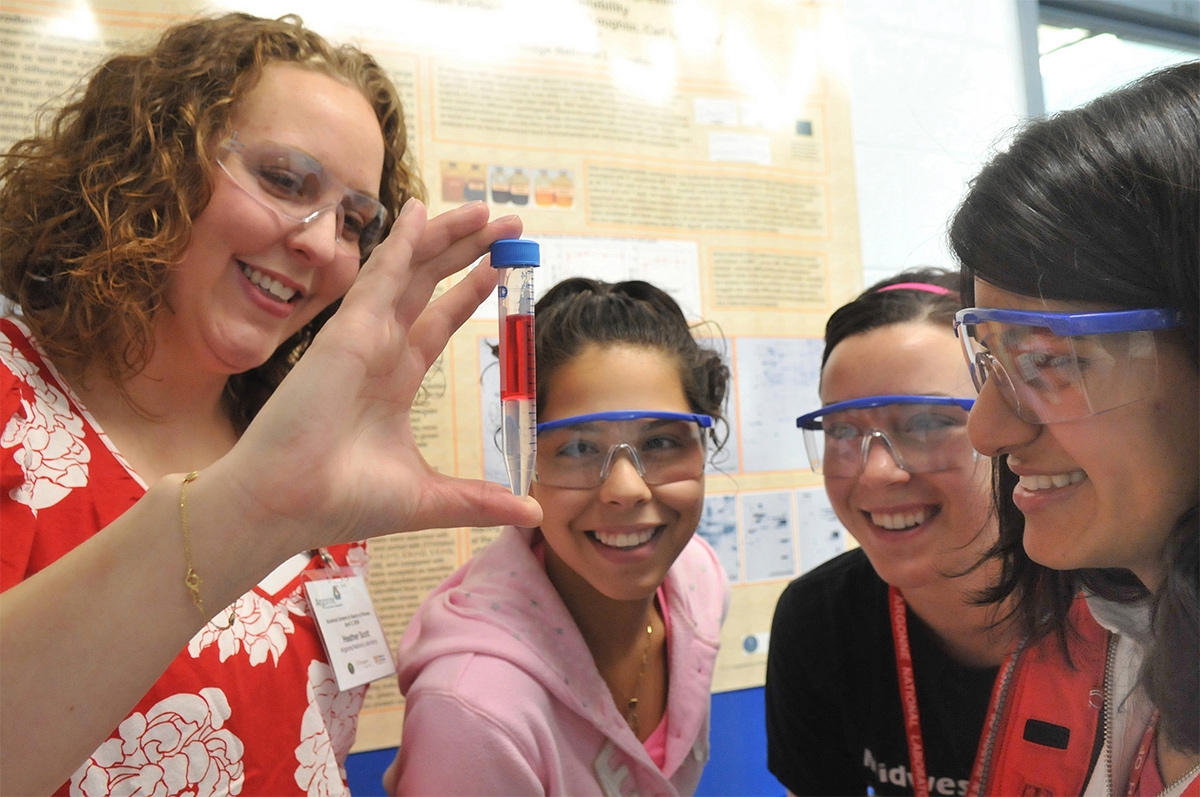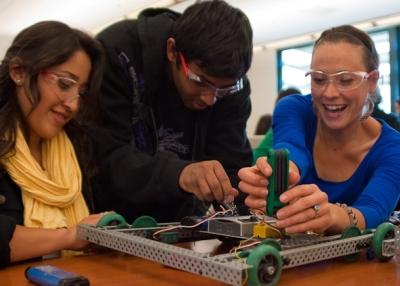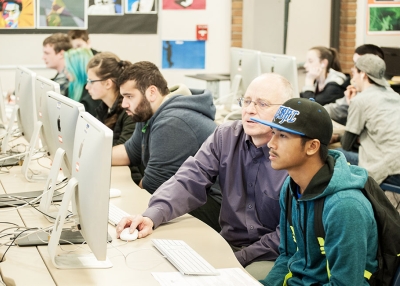Career Readiness in a Global Economy: STEM and CTE
A series of online professional development modules

The Center for Global Education at Asia Society has partnered with ACTE and Advance CTE to create online professional development modules that support CTE teachers to teach STEM through global content utilizing active, project-based learning. These short, 15–20 minute modules, are self-paced and available through ACTE's CTELearn platform. Descriptions of each module are below together with related activity guides and resources featured in each module. All materials are free of charge due to generous support from the Project Management Institute Educational Foundation (PMIEF).
Course Modules
- Module 1: Global Workforce Readiness Skills—A New Imperative
- Module 2: Making Local/Global STEM Connections
- Module 3: Designing Your Global STEM Project
- Module 4: Assessing Global STEM Project Based Learning
- Module 5: Facilitating Globally Connected Projects Through Student Project Management, Part 1
- Module 6: Facilitating Globally Connected Projects Through Student Project Management, Part 2
- Module 7: Deep Dive into Global Competence and Respecting Diversity
- Module 8: Enhancing Instruction Through Global Collaborative Projects
- Module 9: Developing Global Workforce Readiness Skills Through CTSOs and Service Learning
- Module 10: Integrating Academics Into Global STEM in CTE
Module 1: Global Workforce Readiness Skills—A New Imperative
One in ten Americans is foreign born, and local communities—urban, suburban, and rural—are growing more diverse. One in five jobs is tied to international trade. This means that CTE educators face a critical new imperative: to prepare all students for work and civic roles in an environment where success increasingly requires the ability to work with people from diverse backgrounds in global markets.
This introductory module answers the essential question, "As the world becomes more interconnected, how do I ensure my CTE students are prepared with the skills to connect, compete, and collaborate in a global economy?"
At the completion of the module and related tasks, the CTE instructor will be able to:
- Define global competence and its importance to high-quality CTE programs and career pathways
- Describe the steps required to integrate global workforce readiness skills into CTE instruction
- Explain how global skills align to their current instructional sequence and course structure
- Communicate how workforce readiness skills taught in the classrooms will intersect with real-world STEM-related situations
Module 1 Activity Guide and Resources
Module 2: Making Local/Global STEM Connections
Globally minded CTE programs can provide the rigorous and authentic setting necessary to prepare students for the competitive world economy, while offering a more engaging, motivating, and relevant education experience.
This module will help CTE educators make natural global connections to their current instruction. It introduces the UN Sustainable Development Goals (SDGs) and provides a process for connecting these goals to local challenges. By the end of the module, instructors will be prepared to integrate local and global connections into projects to more deeply engage students.
At the completion of the module and related tasks, the CTE instructor will be able to:
- Connect potential local issues to global issues using the UN SDGs
- Identify the CTE, STEM, academic and workforce readiness skills to be achieved through a globally focused STEM project
- Create a global STEM project overview aligned to current instruction
Module 2 Activity Guide and Resources
- Activity Guide
- What Matters to You? Activity. Developed by Asia Society, the What Matters to Young People activity is a facilitated process to identify and determine projects that students care about. It's an excellent way to incorporate student choice into the classroom.
Module 3: Designing Your Global STEM Project
This module will equip instructors in designing, developing, and seeking resources for high-quality, project-based, global STEM projects. It will introduce the instructor to the six criteria outlined in A Framework for High Quality Project Based Learning (PBL), developed by the Buck Institute for Education. It will train instructors to use a common template for PBL lesson plans to teach global workforce readiness skills though STEM.
At the completion of the module and related tasks, the CTE instructor will be able to:
- Explain the six criteria for high quality PBL
- Begin designing a global STEM project plan that integrates global competence
- Use the SAGE framework to create a STEM project with a global connection
- Align high-quality, global STEM projects to their course structure and instructional sequence
Module 3 Activity Guide and Resources
Module 4: Assessing Global STEM Project Based Learning
This module will expand an instructor's options for real-world, authentic assessment of the global PBL experience. It will demonstrate how to observe, assess, and discuss global workforce readiness skills at appropriate times throughout the project. Strategies and examples for expert, peer, and self-evaluation will be included.
At the completion of the module and related tasks, the CTE instructor will be able to:
- Define authentic assessment
- Highlight different forms of assessment that can enhance the global STEM project learning experience
- Authentically assess student growth in global workforce readiness skills and project management using a variety of strategies
Module 4 Activity Guide and Resources
Module 5: Facilitating Globally Connected Projects Through Student Project Management, Part 1
In order to more successfully complete their projects, students need to hone the skills of project management. This module will help instructors define their role as a facilitator of learning during a global PBL experience. It will prepare them to empower students to lead the learning process and manage their projects successfully. It will also provide tools and techniques to train and coach students on successful project management.
At the completion of the module and related tasks, the CTE instructor will be able to:
- Understand the importance of developing project management skills in students
- Define their role as facilitator of a global project experience
- Apply a framework to support student success for the first two phases of project management: Initiating and Planning
Module 5 Activity Guide and Resources
Module 6: Facilitating Globally Connected Projects Through Student Project Management, Part 2
This module continues from Module 5 and examines the second two stages of project management, Executing and Closing.
At the completion of the module and related tasks, the CTE instructor will be able to:
- Apply a framework to support student success for the last two phases of project management: Executing and Closing
- Identify materials, resources and constraints, student supports, modifications, and extensions for a global STEM project
Module 6 Activity Guide and Resources
Module 7: Deep Dive into Global Competence and Respecting Diversity
The increase in diversity across our country means that students will be working and living with people from different backgrounds. It also means CTE instructors increasingly have diverse populations of students in their classrooms.
This module digs deeper into the importance of global competence for workforce readiness, specifically focusing on respect and empathy for diversity, both locally and abroad. Instructors will examine how to leverage the diversity in their classrooms and also how to encourage all students to pursue careers in STEM.
At the completion of the module and related tasks, the CTE instructor will be able to:
- Understand how to better engage students from diverse backgrounds in their learning
- Describe how global competence positively impacts a student’s respect for diversity and interest in pursuing STEM careers
Module 7 Activity Guide and Resources
Module 8: Enhancing Instruction Through Global Collaborative Projects
This module will introduce innovative ways to enhance the global STEM learning experience by connecting your students with students in another country. Examples will show how these connections enable students to work as part of a global team with people from diverse backgrounds. It will also include best practices for creating and leading collaborative global STEM project experiences.
At the completion of the module and related tasks, the CTE instructor will be able to:
- Describe the value of international classroom connections as part of STEM project experiences
- Collaborate with a teacher(s) in another country to create global STEM experiences
- Implement best practices in collaborative global STEM projects
Module 8 Activity Guide and Resources
Module 9: Developing Global Workforce Readiness Skills Through CTSOs and Service Learning
This module unpacks how the tools used to organize and complete a project in the classroom can be applied by students in Career and Technical Student Organizations (CTSOs) activities, including service learning. CTSOs provide an excellent environment for students to develop global workforce readiness and project management skills.
Students can utilize project management to complete service projects and prepare for CTSO competitions. Adding a global connection to these activities will provide students an advantage in the interconnected workplace as well as when they are competing with students across the country-or the world-in CTSO competitions.
At the completion of the module and related tasks, the CTE instructor will be able to:
- Identify opportunities for students to develop global STEM and project management skills through CTSO and service learning activities
- Equip students to use the four domains of global competence and PMI resources to complete a global STEM project through CTSO and service learning activities
Module 9 Activity Guide and Resources
Module 10: Integrating Academics Into Global STEM in CTE
Global STEM projects provide an excellent way to integrate academic content, including math, science, art, world languages, language arts, and more into CTE curriculum. This module unlocks how to make natural connections between academic and technical content in each project.
At the completion of the module and related tasks, the CTE instructor will be able to:
- Identify natural connections between academic and CTE content
- Locate and apply academic and CTE standards alignment resources
Module 10 Activity Guide and Resources
Microcredential Information
- Microcredentials:
- If you are interested in further developing your global competence skills, Digital Promise offers micro credentials. These can be earned by educators as they complete global projects with their students.
Project Partners
The Association for Career and Technical Education (ACTE) is the largest national education association dedicated to the advancement of education that prepares youth and adults for careers. Their mission is to provide educational leadership in developing a competitive workforce. With over 29,000 members in every U.S. state, their membership and reach will be instrumental to this project.
Asia Society is the leading educational organization dedicated to promoting mutual understanding and strengthening partnerships among peoples, leaders, and institutions of Asia and the United States in a global context. Across the fields of arts, business, culture, education, and policy, the Society provides insight, generates ideas, and promotes collaboration to address present challenges and create a shared future.
Advance Cte: State Leaders Connecting Learning to Work is the longest-standing national nonprofit that represents State Directors and state leaders responsible for secondary, postsecondary and adult Career Technical Education (CTE) across all 50 states and U.S. territories. Advance CTE was formerly known as the National Association of State Directors of Career Technical Education Consortium (NASDCTEc).
Funder
PMI Educational Foundation: The mission of the PMI Educational Foundation, a charitable nonprofit organization, is to inspire and empower people to realize their potential and transform their lives and their communities through the use of project management knowledge. Our vision is that all people worldwide have a better tomorrow by applying project management skills in their daily lives.


